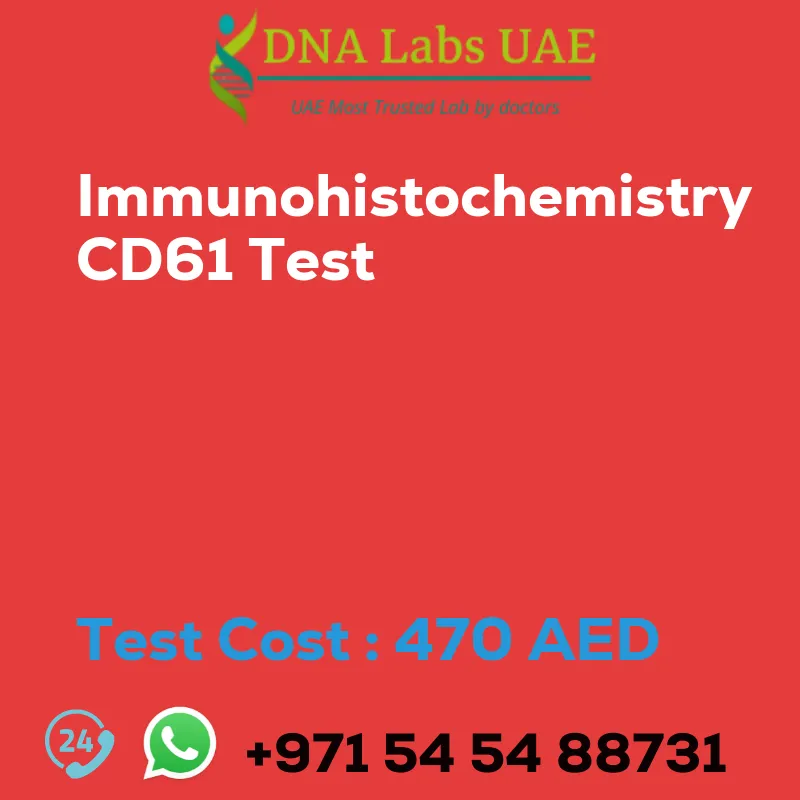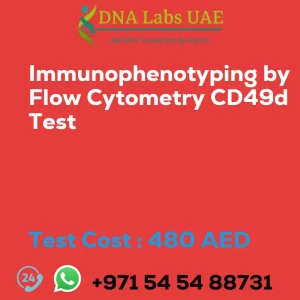IMMUNOHISTOCHEMISTRY CD61 Test
Test Name: IMMUNOHISTOCHEMISTRY CD61 Test
Components: CD61 protein detection in tissue samples
Price: 470.0 AED
Sample Condition: Submit tumor tissue in 10% Formal-saline OR Formalin fixed paraffin embedded block. Ship at room temperature. Provide a copy of the Histopathology report, Site of biopsy and Clinical history.
Report Delivery: Sample Daily by 6 pm; Report Block: 5 days Tissue Biopsy: 5 days Tissue large complex: 7 days
Method: Immunohistochemistry
Test type: Cancer
Doctor: Oncologist, Pathologist
Test Department: HISTOLOGY
Pre Test Information: Provide a copy of the Histopathology report, Site of biopsy and Clinical history.
Test Details
Immunohistochemistry (IHC) CD61 test is a diagnostic test that is used to detect the presence of CD61 protein in tissue samples. CD61, also known as integrin beta-3, is a cell surface glycoprotein that is expressed on platelets and megakaryocytes. It plays a crucial role in platelet aggregation and adhesion to the extracellular matrix.
The IHC CD61 test involves the use of specific antibodies that bind to the CD61 protein in tissue sections. These antibodies are usually labeled with a marker, such as an enzyme or a fluorescent dye, which allows for the visualization of the CD61 protein under a microscope.
The test is commonly used in the diagnosis and classification of various diseases, including platelet disorders, bone marrow disorders, and certain types of cancers. For example, in the field of oncology, the IHC CD61 test can be used to differentiate between different types of tumors, such as gastrointestinal stromal tumors (GIST) and leiomyosarcomas.
The results of the IHC CD61 test are typically interpreted by a pathologist, who examines the stained tissue sections under a microscope. The presence or absence of CD61 protein in the tissue can provide valuable information about the underlying disease process and help guide treatment decisions.
Overall, the IHC CD61 test is a valuable tool in the field of pathology and can provide important diagnostic information in a variety of clinical settings.
| Test Name | IMMUNOHISTOCHEMISTRY CD61 Test |
|---|---|
| Components | |
| Price | 470.0 AED |
| Sample Condition | Submit tumor tissue in 10% Formal-saline OR Formalin fixed paraffin embedded block. Ship at room temperature. Provide a copy of the Histopathology report, Site of biopsy and Clinical history. |
| Report Delivery | Sample Daily by 6 pm; Report Block: 5 days Tissue Biopsy: 5 days Tissue large complex : 7 days |
| Method | Immunohistochemistry |
| Test type | Cancer |
| Doctor | Oncologist, Pathologist |
| Test Department: | HISTOLOGY |
| Pre Test Information | Provide a copy of the Histopathology report, Site of biopsy and Clinical history. |
| Test Details |
Immunohistochemistry (IHC) CD61 test is a diagnostic test that is used to detect the presence of CD61 protein in tissue samples. CD61, also known as integrin beta-3, is a cell surface glycoprotein that is expressed on platelets and megakaryocytes. It plays a crucial role in platelet aggregation and adhesion to the extracellular matrix. The IHC CD61 test involves the use of specific antibodies that bind to the CD61 protein in tissue sections. These antibodies are usually labeled with a marker, such as an enzyme or a fluorescent dye, which allows for the visualization of the CD61 protein under a microscope. The test is commonly used in the diagnosis and classification of various diseases, including platelet disorders, bone marrow disorders, and certain types of cancers. For example, in the field of oncology, the IHC CD61 test can be used to differentiate between different types of tumors, such as gastrointestinal stromal tumors (GIST) and leiomyosarcomas. The results of the IHC CD61 test are typically interpreted by a pathologist, who examines the stained tissue sections under a microscope. The presence or absence of CD61 protein in the tissue can provide valuable information about the underlying disease process and help guide treatment decisions. Overall, the IHC CD61 test is a valuable tool in the field of pathology and can provide important diagnostic information in a variety of clinical settings. |








